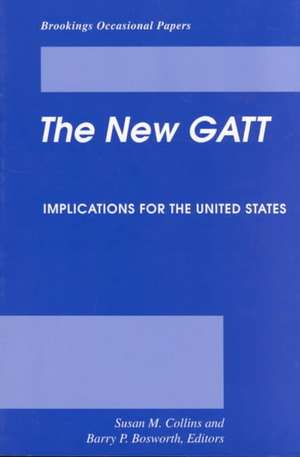The New GATT: Implications for the United States
Editat de Susan M. Collins, Barry P. Bosworthen Limba Engleză Paperback – sep 1994
The Uruguay Round trade agreement, recently ratified by Congress, was the eighth in a series of negotiations under the auspices of the General Agreement on Tariffs and Trade (GATT). Like the ratification proceddings, the negotiations were both contentious and extended. In the end, they substantially changed the structure of the GATT. From its traditional emphasis on reducing formal barriers to trade in goods, the GATT has now moved to a broader agenda of issues that will dominate in a more integrated world economy.
The New GATT encompasses a set of agreements governing trade in goods, trade in services, the protection of intellectual property rights, and new procedures for resolving trade disputes. All of these measures are to be unified under a new institutional structure, the World Trade Organization. In this book, the major features of the new GATT are reviewed and assessed in terms of their implications for the United States.
The contributors are Alan Deardorff, University of Michigan; Bernard Hoekman, the World Bank; John Jackson, University of Michigan School of Law; and Tim Josling, Food Research Institute, Stanford University.
Susan M. Collins is a senior fellow in the Economic Studies program at Brookings and associate professor of economics at Georgetown University. Barry P. Bosworth, a senior fellow at Brookings, is the editor and author of numerous Brookings books, including The Chilean Economy: Policy Lessons and Challenges (Brookings, 1994) and Saving and Investment in a Global Economy (Brookings, 1993).
The New GATT encompasses a set of agreements governing trade in goods, trade in services, the protection of intellectual property rights, and new procedures for resolving trade disputes. All of these measures are to be unified under a new institutional structure, the World Trade Organization. In this book, the major features of the new GATT are reviewed and assessed in terms of their implications for the United States.
The contributors are Alan Deardorff, University of Michigan; Bernard Hoekman, the World Bank; John Jackson, University of Michigan School of Law; and Tim Josling, Food Research Institute, Stanford University.
Susan M. Collins is a senior fellow in the Economic Studies program at Brookings and associate professor of economics at Georgetown University. Barry P. Bosworth, a senior fellow at Brookings, is the editor and author of numerous Brookings books, including The Chilean Economy: Policy Lessons and Challenges (Brookings, 1994) and Saving and Investment in a Global Economy (Brookings, 1993).
Preț: 178.20 lei
Nou
Puncte Express: 267
Preț estimativ în valută:
34.10€ • 35.69$ • 28.38£
34.10€ • 35.69$ • 28.38£
Carte tipărită la comandă
Livrare economică 31 martie-14 aprilie
Preluare comenzi: 021 569.72.76
Specificații
ISBN-13: 9780815710295
ISBN-10: 0815710291
Pagini: 128
Dimensiuni: 152 x 229 x 9 mm
Greutate: 0.2 kg
Editura: Brookings Institution Press
Colecția Brookings Institution Press
ISBN-10: 0815710291
Pagini: 128
Dimensiuni: 152 x 229 x 9 mm
Greutate: 0.2 kg
Editura: Brookings Institution Press
Colecția Brookings Institution Press
Notă biografică
Barry Bosworth is a senior fellow and Robert V. Roosa Chair in International Economics at the Brookings Institution. Susan M. Collins is a senior fellow in Economic Studies at the Brookings Institution and a professor of economics at Georgetown University. Her publications focus on various dimensions of economic policy and performance for developing countries.
Descriere
The Uruguay Round trade agreement, recently ratified by Congress, was the eighth in a series of negotiations under the auspices of the General Agreement on Tariffs and Trade (GATT). Like the ratification proceddings, the negotiations were both contentious and extended. In the end, they substantially changed the structure of the GATT. From its traditional emphasis on reducing formal barriers to trade in goods, the GATT has now moved to a broader agenda of issues that will dominate in a more integrated world economy.
The New GATT encompasses a set of agreements governing trade in goods, trade in services, the protection of intellectual property rights, and new procedures for resolving trade disputes. All of these measures are to be unified under a new institutional structure, the World Trade Organization. In this book, the major features of the new GATT are reviewed and assessed in terms of their implications for the United States.
The contributors are Alan Deardorff, University of Michigan; Bernard Hoekman, the World Bank; John Jackson, University of Michigan School of Law; and Tim Josling, Food Research Institute, Stanford University.
Susan M. Collins is a senior fellow in the Economic Studies program at Brookings and associate professor of economics at Georgetown University. Barry P. Bosworth, a senior fellow at Brookings, is the editor and author of numerous Brookings books, including The Chilean Economy: Policy Lessons and Challenges (Brookings, 1994) and Saving and Investment in a Global Economy (Brookings, 1993).
The New GATT encompasses a set of agreements governing trade in goods, trade in services, the protection of intellectual property rights, and new procedures for resolving trade disputes. All of these measures are to be unified under a new institutional structure, the World Trade Organization. In this book, the major features of the new GATT are reviewed and assessed in terms of their implications for the United States.
The contributors are Alan Deardorff, University of Michigan; Bernard Hoekman, the World Bank; John Jackson, University of Michigan School of Law; and Tim Josling, Food Research Institute, Stanford University.
Susan M. Collins is a senior fellow in the Economic Studies program at Brookings and associate professor of economics at Georgetown University. Barry P. Bosworth, a senior fellow at Brookings, is the editor and author of numerous Brookings books, including The Chilean Economy: Policy Lessons and Challenges (Brookings, 1994) and Saving and Investment in a Global Economy (Brookings, 1993).
